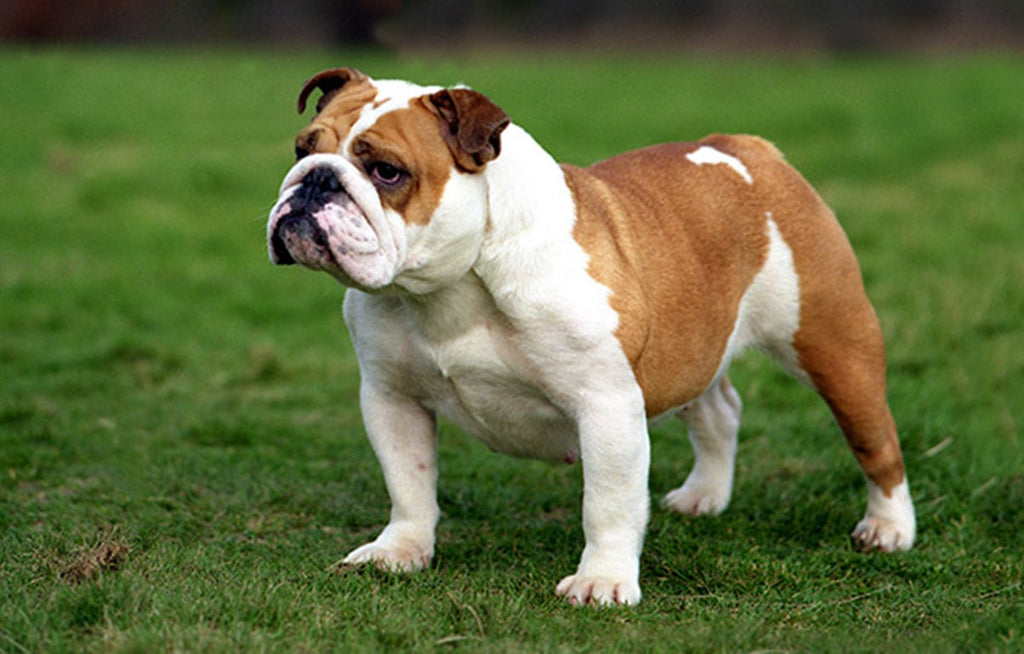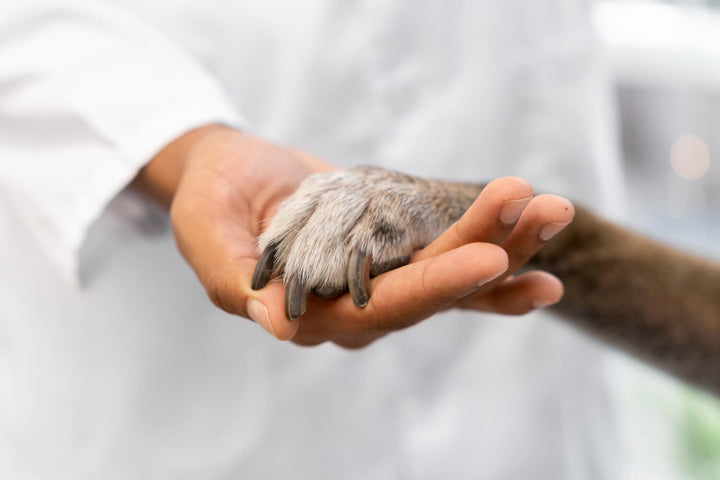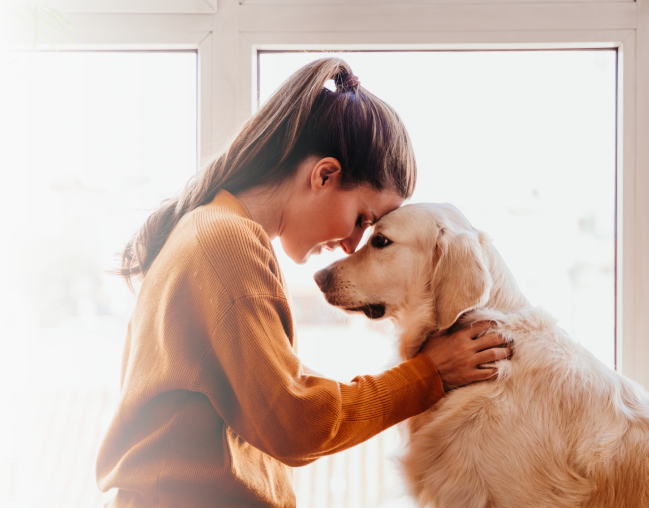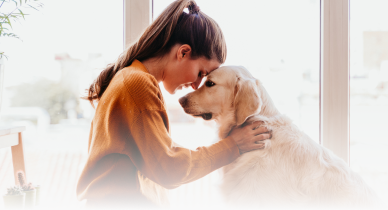With its distinctive appearance and affectionate nature, the Bulldog stands as a timeless symbol of loyalty and companionship. Explore the world of Bulldogs, from fascinating facts to their unique traits, and discover why they've captured the hearts of dog lovers worldwide.
Did You Know these Facts about the Bulldog?
-
Bulldogs were originally bred for bull-baiting, a brutal sport in medieval England. Their courageous spirit and determination in facing bulls showcased their resilience and unwavering bravery.
-
Due to their short muzzle and unique facial structure, Bulldogs are prone to brachycephalic obstructive airway syndrome (BOAS), which can affect their breathing and require special care.
-
Bulldogs' image as a tenacious and determined breed earned them the nickname "Churchill's Bulldog," as they represented the unyielding spirit of Britain during World War II.
-
Despite their historical roles, modern Bulldogs are renowned for their gentle and affectionate nature, making them excellent family pets and loyal companions.
-
Bulldogs have become iconic mascots, representing various universities, sports teams, and even the United States Marine Corps. Their resolute image continues to inspire and symbolize strength.
Bulldogs have secured the #6 place in the AKC´s Dog Breeds popularity list and also in the hearts of dog enthusiasts. Their endearing charm and unique appearance make them a beloved choice for families, singles, and urban dwellers alike. Bulldogs' popularity remains steadfast, highlighting their enduring appeal and ability to forge deep connections.

Traits of the Bulldog Breed
Overall Personality. Bulldogs possess an innate charm characterized by their gentle and friendly disposition. They exude an irresistible warmth and devotion, forging deep and lasting bonds with their human companions. Their affectionate nature makes Bulldogs exceptional cuddle buddies and loyal confidants, enriching the lives of those fortunate enough to share their days with these endearing canines.
Family Life. Bulldogs are tailor-made for family life, thriving in the embrace of a loving household. Their remarkable patience and innate love for children create a harmonious environment where they become steadfast protectors and playmates. With a calm demeanor that belies their strong presence, Bulldogs effortlessly establish themselves as cherished members of the family, forming unbreakable connections with family members of all ages.
Physical Appearance. The Bulldog's physical appearance is a masterpiece of distinctive charm. Their loose, wrinkled skin gives them an iconic look that reflects their history and heritage. Prominent shoulders and a sturdy build underscore their strength and determination. Their coat showcases a captivating array of colors, from striking brindles to classic whites, rich fawns, and captivating pied patterns. Each hue contributes to their unique allure, making Bulldogs a canvas of captivating possibilities.
Sociability. Bulldogs are true socialites, embracing interactions with both humans and fellow furry companions. Their amiable nature and friendly outlook transform every gathering into a joyous occasion. Whether mingling with friends, family, or other pets, Bulldogs radiate an infectious enthusiasm that brightens any environment. Their playful spirit and adaptable disposition make them ideal companions for outdoor escapades, turning every adventure into a cherished memory.
Average Sizes & Life Expectancy
- Height: 12 to 16 inches tall (30.5 to 40.6 cm)
- Weight: 40 to 50 pounds (18 to 23 kg)
- Life Expectancy: Around 8 to 10 years
Detailed Description of the Bulldog Breed
The Bulldog, with its iconic appearance and unwavering loyalty, is a breed that has left an indelible mark on history and the hearts of dog enthusiasts worldwide. From its unique physical features to its remarkable temperament, the Bulldog embodies a captivating blend of strength, charm, and devotion. In this comprehensive exploration, we delve deep into the world of Bulldogs, unveiling their origins, personality, adaptability, care needs, and even their presence in history and pop culture.
Physical Appearance. The Bulldog's distinct appearance is a testament to its historical lineage and utilitarian past. Its sturdy and muscular frame is complemented by a broad chest and powerful shoulders, exuding an air of strength and determination. The loose, wrinkled skin that covers its body harks back to its bull-baiting days, where it served as a form of protection. Despite its compact size, the Bulldog's presence is undeniable, commanding attention and respect.
Traits and Characteristics. Bulldogs are renowned for their endearing traits and distinctive temperament. Their gentle and affectionate disposition belies their historical roles, as they have transitioned from bull-baiters to beloved family companions. Their loyalty knows no bounds, and their innate sense of devotion makes them stand out as unwavering protectors and loyal confidants.
Adaptability. The Bulldog's adaptable nature allows it to flourish in a variety of home environments. Their calm demeanor and relatively low energy levels make them well-suited for apartment living, while their affable nature ensures they thrive in larger homes as well. They can seamlessly integrate into bustling families, harmoniously coexisting with children and other pets. Their versatility makes them an excellent choice for individuals and families seeking a loving and devoted companion.
Care Guidelines. Caring for a Bulldog involves a combination of attention to their physical needs and their emotional well-being. Regular exercise is essential to maintain their health, though their brachycephalic anatomy requires careful consideration in extreme temperatures.
Grooming is relatively low-maintenance, with their short coat needing occasional brushing to keep it clean and healthy. Regular vet visits, dental care, and proper nutrition are vital to ensure a long and happy life.
Training Strategies. Bulldogs, with their inherent intelligence and eagerness to please, are receptive to training efforts. Positive reinforcement methods work wonders, fostering a strong bond between owner and canine. Early socialization and consistent training ensure Bulldogs develop well-rounded personalities, and their cooperative nature allows them to excel in obedience and basic commands.
Notable in History and Pop Culture. The Bulldog's legacy extends beyond homes and hearts. Their historical involvement in bull-baiting shaped their reputation as tenacious and fearless fighters. Over time, Bulldogs have transitioned to become symbols of resilience, representing fortitude in the face of adversity. In pop culture, they've made appearances in movies, advertisements, and even political campaigns, adding to their timeless appeal and charismatic presence.
In conclusion, the Bulldog is a breed that encapsulates a rich history, distinctive appearance, and heartwarming personality. From their unique physical traits to their unwavering loyalty, they continue to capture the imagination of dog lovers around the world. Their ability to adapt, thrive in various homes, and leave an indelible mark in history and pop culture solidify their position as cherished companions and cultural icons.
What to expect when living with the Bulldog Breed
Personality. Owning a Bulldog is a journey filled with heartwarming moments, loyalty, and distinct companionship. Their personality is a captivating blend of affection, devotion, and gentle strength. Bulldogs are renowned for their unwavering loyalty, forming deep bonds with their human counterparts. Their gentle nature and patience make them exceptional family members, thriving in homes where love and attention flow freely.
Ideal Environment. Bulldogs thrive in various environments, adapting effortlessly to both urban apartments and suburban houses. Their moderate energy levels make them well-suited for indoor living, though they eagerly partake in leisurely walks and interactive play. Due to their brachycephalic anatomy, Bulldogs may struggle in extreme heat, so it's crucial to provide a cool and comfortable environment during warm weather.
Maintenance Level. In terms of maintenance, Bulldogs are relatively low-maintenance when it comes to grooming. Their short coat requires regular brushing to minimize shedding and keep their skin healthy. Occasional baths and routine ear and dental care help maintain their overall well-being. Additionally, keeping an eye on their weight and diet is essential, as Bulldogs are prone to obesity, which can lead to various health issues.
Personality. Owning a Bulldog is a journey filled with heartwarming moments, loyalty, and companionship. Their personality is a captivating blend of affection, devotion, and gentle strength. Bulldogs are renowned for their unwavering loyalty, forming deep bonds with their human counterparts. Their gentle nature and patience make them exceptional family members, thriving in homes where love and attention flow freely.
Ideal Environment. Bulldogs thrive in various environments, adapting effortlessly to both urban apartments and suburban houses. Their moderate energy levels make them well-suited for indoor living, though they eagerly partake in leisurely walks and interactive play. Due to their brachycephalic anatomy, Bulldogs may struggle in extreme heat, so it's crucial to provide a cool and comfortable environment during warm weather.
Maintenance Level. In terms of maintenance, Bulldogs are relatively low-maintenance when it comes to grooming. Their short coat requires regular brushing to minimize shedding and keep their skin healthy. Occasional baths and routine ear and dental care help maintain their overall well-being. Additionally, keeping an eye on their weight and diet is essential, as Bulldogs are prone to obesity, which can lead to various health issues.
Personality. Owning a Bulldog is a journey filled with heartwarming moments, loyalty, and distinct companionship. Their personality is a captivating blend of affection, devotion, and gentle strength. Bulldogs are renowned for their unwavering loyalty, forming deep bonds with their human counterparts. Their gentle nature and patience make them exceptional family members, thriving in homes where love and attention flow freely.
Ideal Environment. Bulldogs thrive in various environments, adapting effortlessly to both urban apartments and suburban houses. Their moderate energy levels make them well-suited for indoor living, though they eagerly partake in leisurely walks and interactive play. Due to their brachycephalic anatomy, Bulldogs may struggle in extreme heat, so it's crucial to provide a cool and comfortable environment during warm weather.
Maintenance Level. In terms of maintenance, Bulldogs are relatively low-maintenance when it comes to grooming. Their short coat requires regular brushing to minimize shedding and keep their skin healthy. Occasional baths and routine ear and dental care help maintain their overall well-being. Additionally, keeping an eye on their weight and diet is essential, as Bulldogs are prone to obesity, which can lead to various health issues.
Personality. Owning a Bulldog is a journey filled with heartwarming moments, loyalty, and distinct companionship. Their personality is a captivating blend of affection, devotion, and gentle strength. Bulldogs are renowned for their unwavering loyalty, forming deep bonds with their human counterparts. Their gentle nature and patience make them exceptional family members, thriving in homes where love and attention flow freely.
Ideal Environment. Bulldogs adapt effortlessly to both urban apartments and suburban houses. Their moderate energy levels make them well-suited for indoor living, though they eagerly partake in leisurely walks and interactive play. Due to their brachycephalic anatomy, Bulldogs may struggle in extreme heat, so it's crucial to provide a cool and comfortable environment during warm weather.
Maintenance Level. In terms of maintenance, Bulldogs are relatively low-maintenance when it comes to grooming. Their short coat requires regular brushing to minimize shedding and keep their skin healthy. Occasional baths and routine ear and dental care help maintain their overall well-being. Additionally, keeping an eye on their weight and diet is essential, as Bulldogs are prone to obesity, which can lead to various health issues.
Overall Health Expectations and best Health Tests for the Bulldog Breed
Health Considerations. Bulldogs, like all breeds, have certain health considerations that owners should be aware of. Due to their brachycephalic features, Bulldogs may be susceptible to respiratory issues. Stenotic nares (narrow nostrils), elongated soft palate, and laryngeal collapse are common problems that can affect their breathing. Regular check-ups with a veterinarian can help monitor and address these potential issues.
Another health concern is hip dysplasia, a hereditary condition that affects the hip joints. Regular exercise, maintaining a healthy weight, and providing joint supplements can help manage this condition. Skin allergies and infections can also occur due to their skin folds, requiring diligent cleaning and care.
Recommended Health Tests. To ensure the well-being of your Bulldog, regular health tests are recommended. These can include hip and elbow evaluations, cardiac exams, and ophthalmologic assessments. Brachycephalic obstructive airway syndrome (BOAS) testing can help assess their respiratory health, offering insights into their ability to breathe comfortably. Regular dental care and cleaning are essential to prevent dental issues that can arise from their unique jaw structure.
Best Nutrition, Diet & Supplements for the Bulldog Breed
Nutrition and Diet. Look for dog food that lists a quality protein source, such as chicken, turkey, or fish, as the main ingredient. Bulldogs benefit from a diet rich in protein to support their muscular build and energy levels. Bulldogs are known for their charming wrinkles and folds, but these can also make them prone to skin infections and allergies. Opt for dog food that contains essential fatty acids, such as Omega-3 and Omega-6, which promote healthy skin and a shiny coat. Additionally, these fatty acids have anti-inflammatory properties that can help alleviate skin issues.
Portion control is crucial for Bulldogs, as they are prone to obesity. Feeding them smaller, controlled meals throughout the day rather than one large meal can help prevent overeating and weight gain. Avoid high-calorie treats and table scraps, which can contribute to excess weight and potential health problems.
Bulldogs are brachycephalic breeds, meaning they have flat faces and shorter airways. This anatomical structure can lead to breathing difficulties and gasping for air, especially during meals. To help alleviate this, choose kibble with small pieces that are easier for them to chew and swallow. Feeding them in a calm and quiet environment can also reduce the risk of choking.
Hydration is Key. Ensure your Bulldog always has access to fresh, clean water. Proper hydration is vital for digestion, temperature regulation, and overall vitality.
Supplements. Glucosamine and chondroitin supplements can support joint health, which is essential for Bulldogs prone to hip dysplasia. Omega-3 fatty acid supplements can aid in reducing inflammation and promoting heart health.
Foods to Avoid. Due to their unique anatomy, Bulldogs can be sensitive to certain ingredients in their diet. Avoid foods that contain common allergens such as wheat, soy, and corn, which can lead to digestive issues and skin problems. Additionally, steer clear of foods with artificial additives and preservatives that may trigger sensitivities.
Nurturing Bulldogs through a balanced and tailored diet is a crucial aspect of their well-being. By focusing on high-quality protein sources, essential fatty acids, and portion control, you can provide them with the foundation for a healthy and vibrant life. Consult with your veterinarian to determine the best nutrition plan for your Bulldog's individual needs, ensuring they thrive and enjoy each moment by your side.
Grooming Requirements for the Bulldog Breed
Grooming Bulldogs is a delightful journey that unveils their timeless charm and distinctive appearance. While their short coat is relatively low-maintenance, Bulldogs require regular care to keep them looking their best and feeling comfortable.
Coat Maintenance and Shedding. Bulldogs are moderate shedders, and their short, smooth coat benefits from weekly brushing with a soft bristle brush or grooming mitt. Brushing not only removes loose hair, but it also helps distribute natural oils, enhancing the coat's shine and overall health. Regular brushing also serves as a bonding activity fostering a strong connection.
Paw Care and Hygiene. Paw care is essential for Bulldogs, especially considering their distinctive structure. Inspect their paws regularly for any signs of discomfort or irritation. Keep their paw pads moisturized to prevent dryness and cracking. Short walks on different surfaces help naturally wear down their nails and contribute to their paw health. Trimming Bulldogs' nails is an essential aspect of grooming. Regular nail trims prevent overgrowth and discomfort while promoting healthy foot structure.
Dental Care. Dental care is equally important, as Bulldogs are prone to dental issues. Brush their teeth regularly to maintain oral health and prevent gum disease.
Bathing Frequency. Bathe Bulldogs as needed, typically every 4 to 6 weeks, using a gentle dog shampoo. Be mindful not to over-bathe, as excessive bathing can strip their coat of essential oils, leading to dry skin. Pay special attention to their facial folds and wrinkles, ensuring they are clean and dry to prevent infections or irritations.
Exercise Required for the Bulldog Breed
Bulldogs may not be the most high-energy breed, but they still benefit from regular exercise to keep them mentally and physically fit. Tailoring their exercise routine to their unique needs ensures a balanced and content Bulldog.
Daily walks are a must for Bulldogs, providing them with mental stimulation and a chance to explore their surroundings. Aim for two to three short walks per day, each lasting around 15 to 20 minutes. These walks offer an opportunity for Bulldogs to socialize, stretch their legs, and indulge their curious nature.
Interactive play is a fantastic way to engage Bulldogs' minds and keep them entertained. Toys that challenge their problem-solving skills, such as puzzle toys and treat-dispensing toys, are excellent choices. Short play sessions throughout the day help prevent boredom and encourage mental alertness.
Swimming is a gentle and effective form of exercise for Bulldogs, as it places minimal strain on their joints. However, always supervise them closely around water and ensure they are comfortable and safe in the aquatic environment.
Moderation is key when it comes to exercise, as Bulldogs are prone to overheating due to their short muzzle and brachycephalic structure. Avoid vigorous activities in hot weather, and be vigilant for signs of fatigue or discomfort during play.
Training Tips for the Bulldog Breed
Training Bulldogs requires a blend of patience, consistency, and positive reinforcement. Their intelligent and amiable nature makes them receptive learners, eager to please and form strong connections with their owners.
Do…
-
Start training Bulldogs from a young age, introducing basic commands and routines to establish a foundation of obedience. Use positive reinforcement techniques, such as treats, praise, and rewards, to motivate and encourage desired behaviors.
-
Be consistent by establishing clear rules and boundaries, ensuring everyone in the household follows the same guidelines. Bulldogs thrive on routine and predictability, which helps them understand their role in the family dynamic.
-
Expose them to various environments, people, and other animals to ensure they feel comfortable and confident in different situations.
Don't…
-
Use harsh training methods or punishment, as Bulldogs are sensitive souls who respond best to gentle guidance and positive interactions. Be patient and understanding, celebrating their achievements and progress with enthusiasm.
The Bulldog Breed is Suitable For
Bulldogs are beloved companions that can thrive in a variety of home environments. Their endearing personality, loyalty, and adaptable nature make them a versatile choice for various types of family.
They are well-suited for both urban and suburban living. They don't require a large yard to be happy and can comfortably reside in apartments or houses with smaller outdoor spaces. Their moderate exercise needs, including daily walks and playtime, can be met within a limited area.
These gentle giants are excellent companions for families with children. Bulldogs are known for their patience and affectionate demeanor, making them reliable playmates and protectors for kids of all ages. Their calm and steady nature ensures they can handle the energy and enthusiasm of young children, creating a harmonious family dynamic.
Bulldogs' social nature extends to their compatibility with other pets. When properly introduced and socialized, Bulldogs can coexist peacefully with other dogs and even cats. Their easygoing attitude and friendly disposition make them valuable additions to multi-pet households.
The Bulldog Breed is Not Suitable For
While Bulldogs can adapt to various homes, there are certain environments that may not align with their unique needs. Due to their brachycephalic structure, Bulldogs are sensitive to extreme temperatures. Homes in regions with consistently high temperatures and humidity levels can pose challenges for Bulldogs' respiratory health. It's important to provide a cool and well-ventilated living space and avoid activities during the hottest parts of the day.
Bulldogs' moderate exercise requirements should be considered when choosing a home environment. They may not be the best fit for households seeking an active jogging or hiking companion. While they enjoy short walks and play sessions, Bulldogs are not designed for strenuous physical activities.
Homes with steep staircases can pose challenges for Bulldogs, especially as they age. Their heavy and muscular build can make navigating stairs difficult and increase the risk of joint issues. Considerations for stair accessibility should be taken into account if you live in a multi-story dwelling.
Famous Bulldog Owners
-
Winston Churchill - the revered British Prime Minister, was a proud Bulldog owner. His affection for the breed was so profound that he often referred to his Bulldogs as his "black dog" companions, a term that later became synonymous with his bouts of depression.
-
Martha Stewart - is another notable Bulldog enthusiast. Her Bulldogs, Francesca and Sharkey, were fixtures in her magazine spreads and television shows, showcasing their stylish and endearing presence.
- Brad Pitt - has also shared his life with a Bulldog named Jacques. Jacques was a regular on movie sets and became a beloved fixture in Pitt's life, exemplifying the strong bond that Bulldogs often forge with their owners.
Accomplishments of the Bulldog Breed
Bulldogs have made their mark in various spheres, contributing to their enduring popularity. In sports, Uga, the University of Georgia's live mascot, is a beloved Bulldog who has been a fixture on the football field for decades, symbolizing team spirit and dedication.
Bulldogs have also left their pawprints in the entertainment industry. They have made appearances in movies, commercials, and advertisements, showcasing their charismatic and charming presence. Their iconic appearance has made them sought-after stars on screen and on social media.
In conclusion, Bulldogs are versatile and adaptable companions that can thrive in a range of home environments. Their affable nature makes them ideal family pets, while their ability to co-exist with other pets adds to their appeal. Bulldogs have found their way into the hearts of famous individuals, leaving an indelible mark on pop culture. Their enduring popularity and unique qualities ensure that Bulldogs remain cherished companions and cultural icons.
The History of the Bulldog Breed
The history of the Bulldog is a fascinating tale that spans centuries, revealing a breed that has evolved from its original purpose to become a beloved companion with an enduring legacy. This breed's origins are intertwined with a rich tapestry of tasks, from tenacious bull-baiting to today's cherished family member.
Creation and Purpose. The Bulldog's roots can be traced back to medieval England, where their ancestors played a vital role in bull-baiting, a brutal sport where dogs were pitted against fierce bulls in public spectacles. This required a breed with unparalleled courage, strength, and determination. Bulldogs of that era possessed a stocky build, powerful jaw, and unyielding tenacity, qualities that were crucial for controlling and subduing bulls.
As times changed, so did the Bulldog's role. The cruel sport of bull-baiting was eventually outlawed, leading to a shift in the breed's purpose. Bulldogs were no longer needed for combat, and their fierce disposition was transformed into a more amiable and companionable temperament. Selective breeding over generations focused on refining their temperament, resulting in a breed that is gentle, loyal, and affectionate.
Early Roles and Evolution. Throughout the 19th and early 20th centuries, Bulldogs experienced further transformation. As industrialization led to urbanization, Bulldogs found themselves in urban settings, adapting to city life as loyal and steadfast companions to their owners. The breed's appearance also evolved, with a focus on enhancing their distinctive features, such as their loose skin, pushed-in nose, and distinctive wrinkles.
Changes and Modern Impact. In the modern era, Bulldogs have become a symbol of endurance and resilience. Despite facing challenges related to their unique anatomical traits, the breed's popularity has continued to rise. Breed enthusiasts and responsible breeders have worked to address health concerns while preserving the Bulldog's unmistakable appearance and charming personality.
Today, Bulldogs are cherished family pets and companions known for their affectionate nature, loyalty, and unwavering devotion. Their history, marked by dedication to their original purpose and subsequent transformation into beloved companions, is a testament to their remarkable journey through time. As a breed that has adapted, evolved, and captured the hearts of countless individuals, the Bulldog continues to leave an indelible mark on history and remains a beloved and iconic member of the canine world.
The Bulldog Breed Standard
The Bulldog, a beloved and iconic breed, is categorized within the Non-Sporting Group by the American Kennel Club (AKC). Known for their distinctive appearance and endearing personality, Bulldogs are a testament to resilience and adaptability.
The American Kennel Club's Breed Standard for Bulldogs is a comprehensive guideline that outlines the ideal characteristics of this remarkable breed. Bulldogs are to possess a sturdy and muscular build, with a medium-sized frame that exudes strength and agility. Their distinctive features include a pushed-in nose, loose skin forming wrinkles on the head and neck, and a unique rolling gait. The standard places great emphasis on the breed's balanced and amiable temperament, highlighting their affectionate nature and loyalty.
The Bulldog Club of America (BCA) serves as the devoted guardian of the breed's legacy and advancement. With the mission to promote and protect Bulldogs, the BCA offers a wealth of resources, educational materials, and events to support both breed enthusiasts and responsible breeders. To learn more about the Bulldog Club of America, visit their website at www.bulldogclubofamerica.org.
General Appearance
Head, Muzzle, Nose. The Bulldog's head is a masterpiece of character, defined by its square shape and deeply wrinkled skin. The wide-set, dark eyes radiate warmth and intelligence, while their undershot jaw and short muzzle lend them a distinctive, endearing expression. The pushed-in nose contributes to their unique appearance, enhancing their iconic charm.
Teeth. Bulldogs' teeth are prominent due to their undershot bite, where the lower teeth extend beyond the upper teeth.
Neck. The Bulldog's sturdy neck is muscular and arched, conveying strength and resilience. It supports their substantial head, emphasizing their confident presence.
Body. Bulldogs boast a well-proportioned, compact body that exudes power and balance. Their chest is broad and deep, reflecting their history of strength and endurance. The well-sprung ribs and short back contribute to their robust frame.
Tail. The Bulldog's tail is short and set low, often described as a "screw" or "corkscrew" tail. It sits snugly against their body, showcasing their unique tail carriage.
Coat. The Bulldog's coat is short, smooth, and sleek, requiring minimal maintenance. Their coat comes in a variety of colors, including brindle, fawn, white, and pied, each contributing to their individual charm.
Size. Bulldogs are medium-sized dogs, with males typically weighing between 50 to 55 pounds and females weighing between 40 to 45 pounds. Their compact size and sturdy build make them well-suited for various living environments.
Gait. Bulldogs possess a distinctive rolling gait that reflects their unique structure. Their front legs are slightly shorter than their hind legs, contributing to their characteristic swagger as they move. Despite their stocky build, Bulldogs should move with an easy and fluid motion, reflecting their balanced and harmonious physique.
In conclusion, the Bulldog's appearance is a testament to their history, purpose, and enduring charm. From their wrinkled head to their distinctive gait, Bulldogs are a breed that captures attention and hearts with their iconic and endearing features.
Reputable Breeders
For those seeking a well-bred Bulldog, there are reputable breeders who prioritize health, temperament, and the breed's standard. Here are a few notable breeders:
Top Shelters for Adoption
Adopting a dog can be a rewarding experience. Here are five shelters where you might find a Bulldog in need of a loving home:
Top 5 Frequently Asked Questions & Answers about the Bulldog Breed
Are Bulldogs good with children?
Yes, they are renowned for their gentle and affectionate nature, making them excellent companions for families with children.
Do Bulldogs require a lot of exercise?
They have moderate exercise needs. Daily walks and play sessions are sufficient to keep them happy and healthy.
Do Bulldogs get along with other pets?
With proper socialization, they can coexist harmoniously with other pets, including dogs and cats.
Are Bulldogs prone to health issues?
Bulldogs tend to experience certain health challenges, including respiratory issues due to their unique facial structure. Regular veterinary care and a healthy lifestyle can mitigate potential concerns.
Are Bulldogs easy to train?
While they are intelligent and eager to please, they may exhibit a stubborn streak. Positive reinforcement techniques, patience, and consistency are key to successful training.
A Final Tip for Bringing a Bulldog into Your Life
Introducing a Bulldog into your life is an invitation to welcome a lovable, charming, and enduring companion. Their history as tenacious and friendly dogs, combined with their affectionate disposition, makes them ideal for families seeking a loyal and entertaining addition. While Bulldogs may not be the most active breed, investing time in bonding, care, and training will unleash their true potential as cherished family members.
Understanding their quirks and needs is the key to nurturing a fulfilling and joyful partnership with your Bulldog. With their unique appearance and endearing personality, Bulldogs are more than pets—they become beloved members of your household, ready to share love and laughter.
Valuable Resources for Your Journey to Parenting a Bulldog
At Felicitails you will find many wonderful services, supplies and guides for your life ahead with a loving pup at your side.

Hope You Enjoyed The Read!
Tag Cloud

A warm welcome from Lindsay & Huck (my English Pointer). Hope you enjoy the read and find just what you are looking for when it comes to living your best life with your loved pets.

-
Dog Breeds
(42)
-
Emotional Support Animals
(10)
-
Dog Grooming
(6)
-
Dog Health
(18)
-
Life with a Dog
(18)
-
Dog Nutrition
(11)
-
Service Animals
(11)
-
Dog Training
(5)







